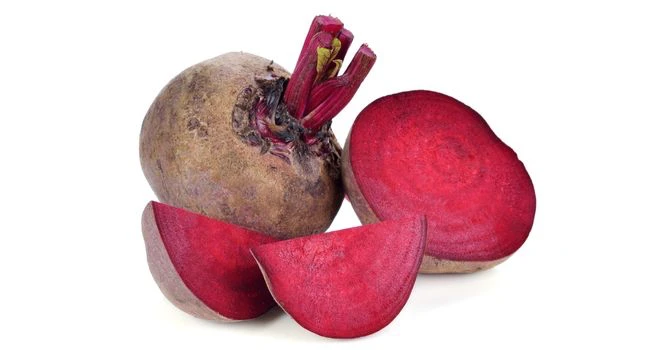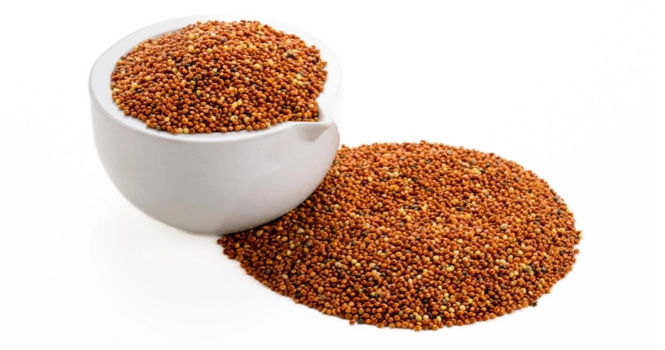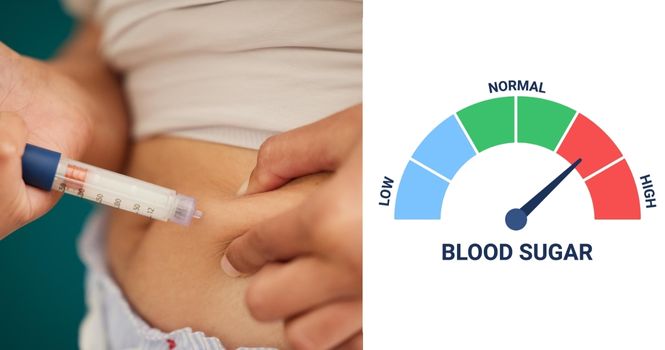First, Let’s see the Nutritional Profile of Beetroot, before looking into the role of beetroot in Managing Blood Sugar Levels in Diabetics and healthy individuals.
Nutritional Facts of Beetroot per 100g of Serving size
| Nutrient | Amount | % Daily Value* |
| Calories | 43 | |
| Total Fat | 0.2 g | 0.30% |
| Saturated fat | 0.03 g | |
| Polyunsaturated fat | 0.06 g | |
| Monounsaturated fat | 0.04 g | |
| Cholesterol | 0 mg | 0% |
| Sodium | 78 mg | 3% |
| Total Carbohydrates | 9.6 g | 3.20% |
| Dietary fiber | 2.8 g | 11% |
| Sugars | 6.8 g | |
| Protein | 1.6 g | 3.20% |
| Vitamin A | 2 IU | 0.04% |
| Vitamin C | 4.9 mg | 8.20% |
| Vitamin D | 0 IU | 0% |
| Vitamin B-6 | 0.067 mg | 5% |
| Vitamin B-12 | 0 µg | 0% |
| Calcium | 16 mg | 1.60% |
| Iron | 0.8 mg | 4.50% |
| Magnesium | 23 mg | 5.70% |
| Potassium | 325 mg | 9.30% |
| Folate (B9) | 109 µg | 27.30% |
| Phosphorus | 40 mg | 4% |
| Zinc | 0.35 mg | 2.30% |
*Percent Daily Values are based on a 2,000 calorie diet. Your daily values may be higher or lower depending on your calorie needs.
They are a great source of fiber, vitamin C, magnesium, and folate. They are also packed with potent antioxidants such as betalains that give them their vibrant color.
The nitrates present in beetroot are converted into nitric oxide in the body, which is known to have numerous benefits, such as relaxing and dilating blood vessels, thus improving blood flow.
What is Beetroot’s role in managing Blood Sugar Levels?
The potential benefit of beetroot on blood sugar levels could be attributed to their high fiber content and low glycemic index (GI).
- Fiber: Dietary fiber is known to slow down the absorption of sugar into the bloodstream, which can prevent sudden spikes in blood glucose levels. This can be particularly beneficial for managing both type 1 and type 2 diabetes.
- Low Glycemic Index (GI): Beetroot has a low glycemic index, meaning that its sugar content is released slowly into the bloodstream. This results in a more steady and gradual rise in blood sugar levels, rather than a quick spike.
Mechanism of Action:
The exact mechanisms by which beetroot may influence blood sugar levels are not entirely clear and more research is needed.
However, preliminary studies suggest that the nitrate content in beetroot may improve blood vessel function and lower overall inflammation, both of which are important for overall metabolic health.
Furthermore, the fiber in beetroot might contribute to better glucose control by slowing the rate of glucose absorption from the gut into the bloodstream.
Current Research Findings:
As of now, research on beetroot and its effect on blood sugar control is limited and somewhat conflicting.
Some studies suggest that beetroot juice might improve endothelial function in people with type 2 diabetes, which could potentially lead to better glucose control. However, other studies have not found significant effects on blood glucose.
As such, while the potential is there, more comprehensive research, especially large-scale human trials, are needed to draw solid conclusions.
Integrating Beetroot into the Diet:
Despite the need for more research, beetroot is a nutritious vegetable that can be a part of a balanced diet. It can be enjoyed in a variety of ways, such as raw in salads, cooked, pickled, or in the form of juice.
Some people might prefer beetroot supplements, which often come in a capsule form. However, it’s important to note that natural food sources usually provide a broader range of nutrients.
Caution:
While beetroot is generally considered safe for most people, some may experience red or pink urine, a condition known as beeturia, or pink stools after consuming beetroot or beetroot juice.
It’s also worth noting that beetroot juice can be high in sugars, so it’s important to consume it in moderation, particularly for those watching their blood sugar levels.
A healthy lifestyle, which includes a balanced diet, regular physical activity, and, if necessary, medication, remains the cornerstone of blood sugar management.
Always consult a healthcare provider or a dietitian before making significant changes to your diet, especially if you have chronic conditions such as diabetes.













